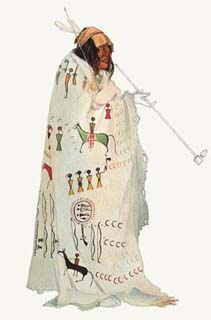Anth 3511 Professor Gibbon
1. Introduction:
Explaining Prehistoric Cultural Change
Why study how archaeologists and others explain the North American archaeological record?
The nature of the archaeological record in North America (mostly small amounts of buried, disturbed non-organic materials).
2. Major research programs in North American archaeology: A. Culture history: taxonomic systems, space-time frameworks, diffusion,, migration.
B. Processual archaeology: 'New Archeology,' structural-functionalism, systems theory, cultural ecology, environmental reconstructions, settlement pattern studies, science, Lewis Binford, Julian Steward C. Structural/Post-Processual archaeology: codes and rules, meanings, hermeneutics, thick description/contextual archaeology, Ian Hodder D. Cultural Resource Management (CRM): conservation, management, public education; historical significance, cultural tourism.
3. Making sense of the archaeological record:
A. ethnographic analogy: using the ethnographic (historic) record as a source of hypotheses.
B. Middle range theory: transformation processes, Michael Schiffer. C. Experimental archaeology: controlled experiments. D. Ethnoarchaeology: study of contemporary societies for clues to the formation of archaeological materials and sites.
4. Growing native American participation in North American archaeology:
NAGPRA: Native American Protection and repatriation Act of 1990, paradox for spurring study.
A new era of cooperation with native Americans?
(1) New ways ofunderstanding?
(2) Challenges to science (e.g., Vine Deloria, Jr.)?
12/15/97 Encyclopedia of North American Prehistory - Guide, Table 10
Radiocarbon Age Calibrated Age Range A.D. 1500 A.D. 1300 to 1515 1000 870 to 1230 500 265 to 640 A.D 1 175 B.C. to A.D. 235 500 400 to 820 1000 905 to 1530 2000 2305 to 2830 3000 3640 to 3950 4000 4575 to 5235 5000 B.C. 5445 to 6285 B.C. Beyond the limits of calibration ...
(For discussion, see: S. Bowman. 1990. Radiocarbon Dating. British Museum Publication, London; Pearson, G. W. 1987. How to Cope With Calibration. Antiquity 60:98--104; M. Stuiver and G. W. Pearson. 1986. High-Precision Calibration of the Radiocarbon Time Scale, AD 1950--500 BC, in Radiocarbon 28 (2B), calibration issue, proceedings of the Twelfth International Radiocarbon Conference, 1985, Trondhejm, Norway, edited by M. Stuiver and R. S. Kra)
Simplified Radiocarbon Date Calibration
Go To The Index Page

